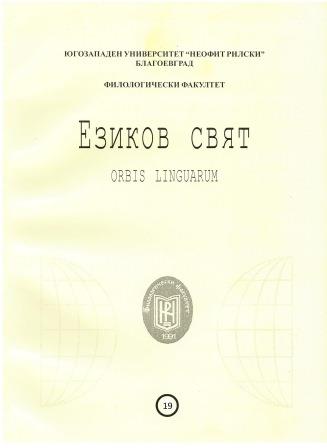ТЕНДЕНЦИЯ К СОКРАЩЕНИЮ ФОНЕМНОГО СОСТАВА СЛОВА КАК ПРОБЛЕМА ОБЩЕСЛАВЯНСКИХ ТИПОЛОГИЧЕСКИХ ИССЛЕДОВАНИЙ
THE TRENDS OF REDUCTION OF THE PHONEMIC STRUCTURE OF THE WORD AS A GENERAL PROBLEM OF SLAVIC TYPOLOGICAL RESEARCH
Author(s): Olga NovakSubject(s): Language studies, Language and Literature Studies, Theoretical Linguistics, Phonetics / Phonology, South Slavic Languages
Published by: ЮГОЗАПАДЕН УНИВЕРСИТЕТ »НЕОФИТ РИЛСКИ«
Keywords: South Slavic languages; unstable consonant; dialect; phoneme; elision; substitute
Summary/Abstract: This research is dedicated to spirantization, elision and substitution of the phoneme /h/ as the specific feature of the South Slavic dialects represented in a South Slavic dialect continuum, but reflected in different ways in literary languages.Throughout the Bulgarian linguistic territory the phoneme [h] is consistently preserved in its etymological place only in the Rupian dialects, more accurately only in the Rhodope (Middle Rupian) and Thracian (South Rupian) dialects. In Serbocroatistics the problem of the status and functioning of the phoneme [h] is challenging. In the Serbian and the Croatian languages the instability of consonant phonemes is not only the feature of the dialectal continuum, but also of the literary speech which only emphasizes the close connection between these forms of the language. The listed characteristics of the phonetic model of a word in South Slavic dialects can be attributed to the number of syntagmatic features that are specific to vocal-type systems according to A. Isachenko's classification. It states that the typological sign has not only a static form (a system of phonemes, their number and ratio), but also a dynamic one (rules for the combination of sounds). Taking into consideration the fact that the instability of /h/ is not a common Slavic feature, I consider it possible to agree with the conclusions of the Slavicists that this phoneme sounded differently in Slavic dialects in the late Slavic period. The instability of the phoneme /h/ in South Slavic dialects and the tendency to it substitutions can be regarded as Slavic Balkanism.
Journal: Езиков свят - Orbis Linguarum
- Issue Year: 19/2021
- Issue No: 2
- Page Range: 026-030
- Page Count: 5
- Language: Russian

